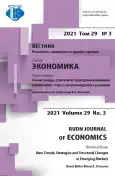Trade facilitation: definition and current significance for economic development of Russia
- Авторлар: Nenadyshina T.S.1
-
Мекемелер:
- Russian Foreign Trade Academy
- Шығарылым: Том 29, № 3 (2021): New trends, strategies and structural changes in emerging markets
- Беттер: 554-566
- Бөлім: Economic integration and globalization
- URL: https://journal-vniispk.ru/2313-2329/article/view/324211
- DOI: https://doi.org/10.22363/2313-2329-2021-29-3-554-566
- ID: 324211
Дәйексөз келтіру
Толық мәтін
Аннотация
At the present stage of the functioning of the multilateral trading system there is an increasing need to find new approaches to the development and facilitation of trade other than the reduction of tariff and non-tariff barriers. Trade facilitation is the field of activity of many international organizations, it is recognized as an effective tool for promoting economic development and capacity building both at the level of an individual state, and within integration associations and regions, which, due to their geographic location have close political and economic ties. The areas targeted by trade facilitation measures are diverse and have evolved over time. This has led to the fact that the concept of “trade facilitation” does not have a specific applied characteristic, as well as a generally accepted framework for the implementation of initiatives in this area, which undoubtedly deserves scientific attention. This approaches to interpretation of “trade facilitation” term in Russian practice are described. Also were hold the analyses of considering term definitions, which were defined by international organizations in accordance with their scope of work and those, which are proposed by scientists. The main approaches to understanding of considering term were exposed, that make possible to characterize the essence and main directions of trade facilitation measures implementation. The feasible economical profits of implementing initiations in field of trade facilitation in framework of international trade both from supply and demand are described. In addition, the main perspectives of trade facilitation measures for different participants of international trade were systematized. In conclusion, defined author’s approach for understanding of “trade facilitation term” concerning the interests of Russia in this sphere. The author identified the most relevant vectors for the implementation of measures to facilitate trade procedures, which reflect the current directions for the implementation of the economic policy of the Russian Federation, as well as ensure the creation and maintenance of a favorable business environment to stimulate the development of foreign economic activity and foreign trade.
Негізгі сөздер
Авторлар туралы
Tatiana Nenadyshina
Russian Foreign Trade Academy
Хат алмасуға жауапты Автор.
Email: tatiana.nenadyshina@gmail.com
postgraduate student of the Department of International Trade and Foreign Trade of Russian Federation
6А Vorob’evskoe Shosse, Moscow, 119285, Russian FederationӘдебиет тізімі
- Antonini, C., Beck, C., & Larrinaga, C. (2020). Subpolitics and sustainability reporting boundaries. The case of working conditions in global supply chains. Accounting, Auditing & Accountability Journal, 33(7), 1535-1567
- Balandina, G.V. (2015). Facilitating trade or simplifying border procedures. Trade Policy, (1), 144-170. (In Russ.)
- De, P. (2020). Trade facilitation in times of pandemic: Practices from South and South West Asia. ARTNeT Working Paper Series, (198). Bangkok: Asia-Pacific Research and Training Network on Trade (ARTNeT).
- Duval, Y. (2007). Trade facilitation beyond the Doha round of negotiations. Working Paper Series, (50). Bangkok: Asia-Pacific Research and Training Network on Trade (ARTNeT).
- Grainger, A. (2011). Trade facilitation: A conceptual review. Journal of World Trade, 45(1), 36-62.
- Ismail, N.W. (2021). Digital trade facilitation and bilateral trade in selected Asian countries. Studies in Economics and Finance, 38(2), 257-271.
- Kumari, M., & Bharti, N. (2021) Linkages between trade facilitation and governance: Relevance for post-COVID-19 trade strategy. Millennial Asia, 12(1), 097639962097234. https://doi.org/10.1177/0976399620972346
- LeBaron, G. (2021). The role of supply chains in the global business of forced labour. Journal of Supply Chain Management, 57(2), 29-42.
- Mattoo, A., Rocha, N., & Ruta, M. (2020). Handbook of deep trade agreements. Washington, DC: World Bank.
- Morrissey, O., & López, K. (2015) Handbook on trade and development. Edward Elgar Publishing.
- Nenadyshina, Т.S. (2021). Identification priority areas of trade facilitation to promote the development of Russia’s foreign trade. International Trade and Trade Policy, 7(2), 80-96. (In Russ.)
- Persson, M. (2013). Trade facilitation and the extensive margin. The Journal of International Trade & Economic Development, 22(5), 658-693.
- Portugal-Perez, A., & Wilson, J.S. (2012). Export performance and trade facilitation reform: Hard and soft infrastructure. World Development, 40(7), 1295-1307.
- Samuelson, P. (1954). The transfer problem and transport costs: Analysis of effects of trade impediments. The Economic Journal, 254, 264-289.
- Sela, S., Yang, A., & Zawacki, M. (2020). Trade facilitation best practices implemented in response to the COVID-19 pandemic. Trade and COVID-19 guidance note. World Bank.
- Toropygin, A.V. (2013). Avoiding being a “weak link” in global trade facilitation. Eurasian Integration: Economy, Low, Policy, (14), 206-219. (In Russ.)
- Ugaz, P., & Sun, S. (2020). Case study: China’s trade facilitation responses to the COVID-19 pandemic. Transport and Trade Facilitation Newsletter, Special COVID-19 Edition, Article No. 52. Retrieved March 1, 2021, from https://unctad.org/en/pages/newsdetails. aspx?OriginalVersionID=2328
- Zaki, C. (2014). An empirical assessment of the trade facilitation initiative: Econometric evidence and global economic effects. World Trade Review, 13(1), 103-130
Қосымша файлдар









